
New York University Tisch School of the Arts
Allyson Green, Dean
Rubén Polendo
Associate Dean, Institute of Performing Arts
Tomi M. Tsunoda
Chair, Department of Drama
TISCH DRAMA STAGE Presents:
Perhaps the World Ends Here
Written and Directed by Daniel Leeman Smith
A Message From the Chair
Tisch Drama is a community devoted to creation, collaboration, and critical study. Our degree program combines rigorous conservatory training across ten professional training studios with a robust academic curriculum in Theatre Studies. Through the dynamic production process of TISCH DRAMA STAGE, students have the opportunity to synthesize critical thinking and practical training in the context of creation. This annual production season that sits at the heart of our program brings students together from across the spectrum of training methods, disciplines, and critical frameworks available at the department, and puts them in collaboration with compelling thinkers and practitioners from the contemporary professional field.
Each year, we program a range of artists who are committed to investigation, interrogation, and innovation, and who present a wide spectrum of views, interests, styles, processes, aesthetics, and relationships to language, process, and form. This range of programming provides students with insights on the creation of work across many professional arenas and through many different lenses, giving them a glance into a variety of potential post-graduate trajectories available to them in the field, and offering inspiring models for building sustainable lives in the performing arts.
Most importantly, the productions in our TISCH DRAMA STAGE season are laboratories that exist as extensions of our classrooms. They are spaces where our students’ education is ongoing, through performing on stage as actors, conceiving and building theatrical worlds and aesthetic stories as designers, and contributing to the making of meaning on stage as dramaturgs. While these productions give students a chance to apply their training and education in collaboration with professionals, they are not necessarily meant to be a place where our community of students, faculty, technicians, and guest artists demonstrate a static idea of professional excellence. As with all spaces of learning, these productions are meant to be additional opportunities for experimentation, risk-taking, discovery, learning, and growth – both for our students and for the extraordinary professionals who work with them. This framework is fundamental to the incubation of possibility for the future of our professional field.
Also fundamental to our ongoing endeavor of collaborative work is our ethic of collaboration, which seeks to nurture belonging as learners in our department. A culture that centers on belonging requires a collaborative process that develops connection, mutual aid and trust; it encourages us to be rigorously curious collaborators, and it is at its best when we can readily move through conflict with care and hold one another accountable for our growth.
A final thought of gratitude to you, our audience:
Theatre is a form that depends deeply on the presence of an audience, who bears witness in real time to the artists’ embodiment and living through of images, stories, and ideas. Even after weeks or months of work in rehearsal rooms, meeting rooms, and shops – as theatre artists, we don’t begin to truly understand what we have made until the work is newly witnessed by our audiences. This means that your presence here in our theater is a tremendous contribution to the work, to the learning journey of our students, and to the future of our field.
Thank you for being here, and for your contribution. It is warmly welcomed.
Tomi M. Tsunoda
Chair, Department of Drama
A Note From the Writer/Director
Joy is a radical act for Indigenous folks. By experiencing, engaging with, and performing it, we resist the narratives of trauma, extinction, helplessness, victimhood, and the stereotypical roles forced upon us by the dominant culture of our colonial occupiers and reclaim a bit of what’s been stolen. As an artist, I pursue joy in both the playwriting and playmaking process. To that end, I have employed the Chahta storytelling tradition of shukha anumpa, which translates to hog talk or, more loosely, hogwash in the creation of the show. In this tradition we always begin with humor, making fun of one another, and we continue to weave it throughout the story, regardless of whether it’s funny or sad – in NDN country we say “if we’re not a little bit mean to you, we don’t like you.”
Hatukiklanna sia, I am two-spirit. As a two-spirit theatre-maker, my connection to the Creator and the sacred as well as the tradition of shukha anumpa are vital to the ways in which I work, as evidenced by the very queered, genre-busting play that is Perhaps the World Ends Here. For those who have not encountered the term, two-spirit refers to an Indigenous person who possesses both a masculine and a feminine spirit. It can describe a person’s sexual, gender and/or spiritual identity, and it can also include relationships that could be considered polyamorous. The term is attributed to Elder Myra Laramee, who proposed its use during the Third Annual Inter-tribal Native American, First Nations, Gay and Lesbian American Conference, held in Winnipeg in 1990. It is a translation of the Anishinaabemowin term niizh manidoowag, two spirits. The history and spirituality of two-spirit relatives is important to this play not only because it is my identity, but because it is also the lived experience of our heroine, Frankie Brown.
For many tribal nations across what is now called the Americas, two-spirit folks were considered closer to the Creator because we possess both the spirit of the masculine and the feminine. Our occupation and status in society was high. We were healers and prophets as well as keepers of medicine, keepers of knowledge, and keepers of stories and songs. We were keepers of the village flame and we were charged with parenting orphaned children. We were an important part of civic and spiritual life for our people. Our relationship with our nations was forcibly severed by European Christian settler colonialism and the profoundly limited world view of European immigrants who forced their religion, gender binary, and sexual practices on us, among other things. Adding insult to genocide, the settlers bestowed upon the Indigiqueer-divine the offensive colonial term berdache, which is a Spanish cognate used to indicate a sex slave or kept boy. This term is not only erroneous in its description of who we are and how we exist in the world. It also ignores the multitude of terms for gender and sexuality in the roughly 500 Indigenous languages on this continent – terms that have existed for time immemorial and which extend far beyond the western binary. The colonizers sought to negate the sacred nature of two-spirit people as well as our roles within our communities as a means of destroying and replacing the preexisting culture with one that was strictly white, Christian, and European.
Native Americans have been invisibilized and mischaracterized by popular culture. Unsuccessful in eradicating the Indigenous people of the Americas, our colonizers resorted to writing and telling stories about us that are dehumanizing and remove us from the sight of our neighbors while damaging our mental health and sense of self with harmful stereotypes. We are frequently depicted as extinct historical figures who were war mongering aggressors devoid of civilization. Yet we’re still here, and nothing could be further from the truth. The dominant culture has presented a single narrative about us. During a TED talk in 2009, Nigerian novelist Chimamanda Ngozi Adichie remarked that “to create a single story, show a people as one thing, as only one thing, over and over again…that is what they become,” and so it was incredibly important to me that I provide a vehicle for Native folks to see ourselves portrayed as contemporary people engaged in modernity as a result of the single story presented in popular culture.
I offer Perhaps the World Ends Here as a play that confronts white supremacy and settler colonialism head on with humor, queerness, and the divine. It recognizes that the world is interconnected – that we are all related – the people, the animals, the plants, the fungi, the water, the earth – we are all relatives and we must care for each other because that is all we have on this plane. This play also imagines a world in which queerness is normal and sacred – just as it was prior to 1492. While we at times enter into the depths of sadness experienced by myself and many other Natives who grew up poor, lost loved ones, and fought to reconnect with our ancestors and our culture – we will never stay there long, for joy is a radical act and a powerful medicine passed down from our ancestors. We will dive into the depths of Chata cosmology and the stories of our creation. We will return to the womb of the Earth to meet our maker and our ancestors teach us what we need to know and restore our hope and purpose. We will begin to transform the world around us into something more palatable – something that allows me and my loved ones to succeed.
This story brings me a lot of belly laughs, a sense of release, and a bit of hope. It is my wish that it does the same for you, for I believe that when we heal ourselves we heal the seven generations before us as well as the seven generations that follow, and stories, afterall, are strong medicine. Storytelling can be used in the fight to reclaim our birthright from our colonizers, and it can be the salve that heals our wounds.
I hope you leave here with a little more knowledge about Chata okla and that you will endeavor to make the invisible visible once again. Most importantly, I hope you laugh, cry, gasp, groan, laugh some more, enjoy the show, and talk about it afterwards.
Daniel Leeman Smith, Writer and Director
A Note From the Dramaturg
In Daniel Leeman Smith’s ridiculous play Perhaps The World Ends Here, best friends Frankie and Karl attempt to save the universe through the retrieval of an all-knowing teddy bear. Through friendship, shukha anumpa (hogtalk), and vulnerability, they fight for sovereignty against the ever-encroaching white supremacy of their occupiers. Yet this heightened quest mirrors a stark reality.
For centuries, Native Americans and the United States government have maintained a contentious relationship after settler colonialists in the Americas forced the displacement of Native Americans to reservations and conducted systematic genocide. These reservations are largely forgotten and ignored in the civic sector which led to a lack of resources, increased rates of illness, depression, and suicide. Adding to this conscious ignorance is the antiquated portrayal of Native Americans and their history. Imperialism, and the United States’ 19th-century “war policy,” along with the Secretary of the Interior’s “Code of Indian Offences” prevented Native traditions, dances, stories, and perspectives from being shared and documented, resulting in a harmful perception of perceived “savagery”. Despite all this, disparity forged into hope as Native Americans began to disrupt American life through civil actions resulting in the Red Power Movement of the 1960s and 70s, which eventually led to the passage of the American Indian Religious Freedom Act in 1978, restoring religious sovereignty to tribal nations.
At the foundation of Native peoples’ ability to persevere is the understanding that while life may be short, joy is a necessity. Laughter is then not only a medicine but a light to follow. Native absurdity relies on this, because how else can we make sense of a world that continues to rot? When the world seeks to constrain who you are – the only response is to liberate yourself. And that’s camp or rather theatre of the ridiculous. Its tenets are clear – be preposterous and larger than life itself because tradition is boring. And Leeman Smith’s world is far from traditional – it transgresses the edges of gender, absurdity, social commentary, and queerness.
Even in the setting of the play, 2019, Frankie and his lineage continue the fight, started by their ancestors many suns ago. It is thanks to them that we see the pain, humor, and hope that comes from reclaiming who you are in light of a system that seeks to eradicate your existence, honoring the interconnectedness of all struggles against oppression.
Dr. Courtney Elkin Mohler, Sal Rubio, Mauricio Tafur Salgado
Who’s Who – The Creative Team
Daniel Leeman Smith (Director & Writer) is a proud two-spirit citizen of the Choctaw Nation of Oklahoma currently based in New York City. He is a director, playwright, and theatre educator whose work is often positioned at the intersection of community, art, education, and activism with a focus on Native joy. He is excited to be making his TISCH DRAMA STAGE debut with Perhaps the World Ends Here
Recent credits include: Ajijaak on Turtle Island (Associate Director, National Tour), Where We Belong (Assistant Director, The Public Theater/Woolly Mammoth), Flying Bird’s Diary (Associate Director, at the Tony Award winning Long Wharf Theatre), Yu-Che-Wah-Kenh, Poyvfekcv, and Built On Bones (Director, New Native Play Festival, Yale Indigenous Performing Arts Program), Neechie Itas (Filmographer & Digital Designer, Oklahoma Indigenous Theatre Co.), Perhaps the World Ends Here (Writer/Director/Filmographer/Editor, Local Classic Repertory), and Repulsing the Monkey (Director, White Horse Tavern). In 2015, he served as the Assistant Stage Manager and 2nd Unit Production Manager on the film Distant Vision, working directly under Academy Award winner Francis Ford Coppola.
Daniel teaches Indigenous Theatre in the NYU Tisch Department of Drama. He is a member of the Lincoln Center Theater Directors Lab, ATHE, and DGA, as well as an Associate Member of SDC. Daniel holds a BFA and MA from Oklahoma City University, and is a doctoral candidate in Educational Theatre at NYU Steinhardt.
Judi Lewis Ockler (Fight & Intimacy Director) has collaborated with Classic Stage Company (Snow in Midsummer,A Man of No Importance), Signature Theater (Hot Wing King,One in Two,Jasper), WP theater (Hatef**k, Bite Me, Our Dear Dead Drug Lord), Cherry Lane Theater (This Beautiful Future), New World Stages (Dracula, a Comedy of Terrors!), The Mint Theater (The Rat Trap, US premiere) Bedlam Theater Company (Persuasion), TOSOS at the Flea Theater (Bar Dykes, Rock the Line).Intimacy Coordinator tv/film credits include Out of the Blue, directed by Neil La Bute; Plan B, with Jamie Lee and John Heder, Up Here (Hulu). She teaches and directs intimacy and violence in performance at NYU Tisch, National Theater Institute, Atlantic Theater School, AMDA, and Sarah Lawrence College. http://www.judilewisockler.com
Sal Rubio (Production Dramaturg) is a Mexican-american playwright and creative producer based in New York City. His plays include: Contigo Siempre, Tocayos, Body Electric, and only angels live in heaven. He is a member of The Playwright’s Center – New Plays on Campus. He has developed his work at SUNY Purchase’s New Plays Now fest. His producing work has been awarded grants by the Puffin Foundation and PIC (Pacific Islanders in Communication) and his upcoming short A Hurt Like Mine is slated to release in 2024. Expected BA from SUNY Purchase.
Dr. Courtney Elkin Mohler (Indigenous Theatre & Dramaturgy Consultant) (Santa Barbara Chumash) is dedicated to supporting new work by Native American playwrights. A few recent dramaturgy credits: Desert Stories for Lost Girls by Lily Rushing at Latino Theatre Company/Native Voices at the Autry (NVA) in Los Angeles, Lying with Badgers by Jason Grasl (Blackfeet) at NVA, and The Thanksgiving Play by Larissa FastHorse (Sicangu Lakota). Dr. Mohler is Associate Professor of Theatre at Boston College where she teaches dramaturgy and directing; she co-authored Critical Companion to Native American and First Nations Theatre and Performance: Indigenous Spaces (Bloomsbury-Metheun, 2020).
Mauricio Tafur Salgado (New Play/Text Dramaturg) is an Assistant Arts Professor, the Director of Applied Theatre and the Associate Chair for the Department of Undergraduate Drama at New York University. Mauricio co-founded Arts Ignite, is a Core Faculty member with artEquity, a Co-Producer of CRAFT Courses Programming with the CRAFT Institute, and a Co-Creative Producer with the Remember2019 Collective, which supports local black cultural workers in Phillips County, Ark., as they facilitate spaces for self-determination, memory, and reflection that are directly related to the Elaine Massacre. He co-leads, together with Dr. Nisha Sajnani, a World Health Organization Commission on Arts Practice and Ethics of Care. www.mauriciotsalgado.com
Sophie M. Jacobs (Scenic Designer) Perhaps The World Ends Here is Sophia’s first TISCH DRAMA STAGE production as a lead designer and is thrilled to be a part of this process! She has also worked on TD STAGE’s The Rover and Threepenny Opera as part of the scenic team and TD STAGE’s Big Zoo and Memorial in stage management. Sophia hopes to continue working in theater and is also working more in the world of film: The Beginning Of The End (Art direction) and THOMAS-19 (Production designer). She wants to thank the PTWEH cast and crew for helping create a wonderful show. https://sophiajacobs43.wixsite.com/mysite
Nile Michelle Helgerud (Costume Designer) This is the second TISCH DRAMA STAGE production that Nile has designed! As a transfer student they never thought they’d get this kind of opportunity, so thanks to Erin Black and Chris P. Jaehnig for giving them the opportunity to costume another big show! Thank you to their assistant Aryana and the Undergrad Costume shop for making this show possible. Thanks to all the other designers, cast, and crew. We did it! And last but not least a huge thanks their parents and sisters for always believing in them. insta: @misternilemichelle
Linnie Hampton (Lighting Designer) is an aspiring lighting designer and stage manager in her penultimate year of study at NYU Tisch Drama (Production & Design Studio). She is a member of the Cherokee Nation of Oklahoma and is ecstatic to be designing her first TISCH DRAMA STAGE show. She is grateful for Jesus, her family and friends, the Lighting III class, and her mentor, Jeanette. Recent lighting design credits: Tisch Dance Works III (Tisch Dance), Church Girl Conference 2023. Recent assistant lighting design credits: that’s not supposed to be happening (TD STAGE), En Andersson (NYU Design for Stage and Film).
Ella Danyluk (Co-Sound Designer) is soon-to-be graduating from NYU Tisch School of the Arts this spring with a BFA in drama, a double minor in BEMT and Classics, and an Honors Thesis in Theatre Studies. While she began her journey at Playwrights Horizons Theatre School on the directing track, she discovered her love for sound design and has been at the Production & Design Studio for the past two years. Ella has no tribal affiliation. @ella.k.danyluk
Megan Hayward (Co-Sound Designer) Megan Hayward is so thrilled to be one of the sound designers for Perhaps the World Ends Here. Some recent/favorite credits include That’s Not Supposed to Be Happening and Fun Home for Tisch Drama Stage and SCOUTS: A New Musical.
Zijun (Neil) Wang (Video Designer) is an aspiring director and lighting designer in his final semester of study at NYU Tisch Drama (Production & Design Studio, Playwrights Horizons Theater School). He is thrilled to design one more (last) show at TISCH DRAMA STAGE, as well as making his video design debut. He is grateful for mentors, the Lighting III/Projection Design class, and Light Lab 358. Recent lighting design credits: Anxiety is the Dizziness of Freedom (TD Stage), Cabaret (Tisch New Theatre), Bonefruit (PHTS). “I design lights so human can see things, and I direct to make those things interesting.” zijunneilwang.com
Sofie Daley (Production Stage Manager) is a current third-year in NYU Tisch Drama’s Production & Design Studio, focusing on Stage Management and Costume Design, with minors in Producing, Film Production, and Social Work. Sofie is an aspiring visual storyteller with deep love and curiosity for all types of producing and design for theatre, film & tv, fashion, and live entertainment. This is Sofie’s first mainstage production as Production Stage Manager, and she is very grateful to Daniel for sharing this story, and for the amazingly talented cast and crew who made this process and production as hilarious, ridiculous, beautiful, campy, and important as it is. Previous Tisch Drama credits include daemon (2021), Festival of Voices: Amrika & Memorial (2022), A Midsummer Night’s Dream (2022), Eden (2022), Island Rumble 3: Triple Threat! (2023), FEARLESS (2023). Special thanks to Mom, Liam, Alex, Avie, and all the many beautiful people who lovingly supported her throughout this production. Sofie has no tribal affiliation. @sofiedaley
Who’s Who – The Cast
 |
Eva Harris (Pokni Ava) is of Mayan descent. She is very grateful for the chance to work with this awesome team! She is studying at the Stella Adler Studio of Acting within NYU Tisch Drama. Eva hopes to become a director, teacher, and performer. She would like to express her gratitude for her friends, family, and lovely teachers.
|
 |
Justin Robert Winston (Gramps) (Fight Captain) is thrilled to be in a TISCH DRAMA STAGE production. He mainly focuses on creating and producing his own work, which is supported by being at Experimental Theatre Wing. Comedy is his favorite. And when he’s not performing, he stares wistfully out into the distance for prolonged periods of time. |
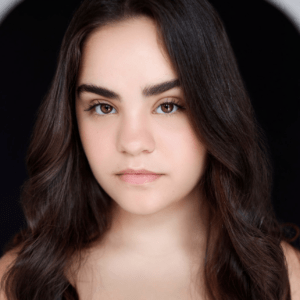 |
Serenity Mariana (Frankie Brown) (she/her) is an Indigenous artist of the Lumbee Tribe of North Carolina, currently based in New York City. She is a junior receiving her BFA in Drama from NYU Tisch, and currently studying in the Lee Strasberg Theatre and Film Institute. She was most recently seen at Montana Repertory Theatre as Shaleena in the brand new play “Can’t Drink Salt Water” by Kendra Mylchenuk Potter. Serenity is passionate about creating new work about identity, belonging, and making the unseen, seen. @serenitymariana |
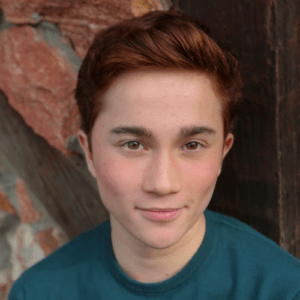 |
Noah Ong Bamola (Karl) is an Actor, Singer, and Dancer originally from the Bay Area. He is incredibly excited to perform in his first TISCH DRAMA STAGE production alongside a remarkably talented, hardworking cast and crew. His most recent work includes performing in 54 Below Celebrates Alice in Wonderland Musicals, Playwright’s Horizon’s John and Jen, and Tisch New Theatre’s Cabaret. He hopes you enjoy this important piece of original, indigenous theatre and encourages non-indigenous audience members to better educate themselves on how to be a better ally. @noahongbamola |
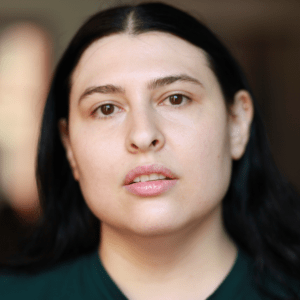 |
Sophia Constantine-Sanchez (Madame Chu Chu/Eskeilay) (Wixárika) is a 3rd-year student at Tisch Drama currently training via the Experimental Theatre Wing’s transfer track. She completed her primary training at Stella Adler Studio of Acting and Stonestreet Studios Conservatory for Screen Acting & Production, respectively. In addition to training at Tisch, they have also spent time at Will Geer’s Theatricum Botanicum, Santa Monica College, and San Francisco’s American Conservatory Theater (ACT). This is Sophia’s first production with Tisch Drama Stage. She is honored to contribute to an original work of indigenous theatre, and thrilled to be a part of this funny, insightful, and unabashedly Native play. |
 |
Alex Grech (Ernst) began his love affair with theater at age six when he joined the Victorian Youth Theatre based out of Melbourne, Australia. Alex continued to be on stage throughout his adolescent life leading him to join NYU TISCH in 2020 at the Experimental Theatre Wing (ETW). Over the recent years Alex has worked on multiple devised performances with ETW as well as shows through the Lee Strasberg Institute. Since arriving in the US Alex has also expanded into the film and television world; more recently working on a feature film entitled ‘Verona’. Alex is excited to return to the stage to close out his time at NYU for this fun and thought provoking performance of ‘Perhaps The World Ends Here’. |
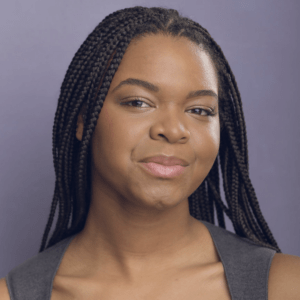 |
Sydney Greenhill (Sint Holo) in her last semester at NYU, currently earning her BFA in Drama and minoring in Psychology. She began in The Meisner Studio and currently studies at the Experimental Theatre Wing. Recent credits include Supermarket 86, Trojan Women, and Homebody. Next, you can find her frolicking onstage for her ETW Indie. She would like to give huge thanks to the lovely PTWEH team for their constant support and inspiration!! |
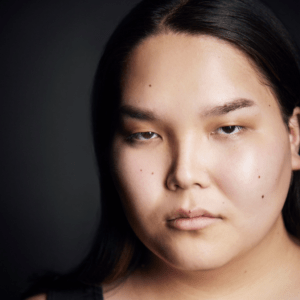 |
Artemis Wheelock (Nanishta Hullo Chito) (Māhūwahine) is currently a senior at Tisch Drama. Previous credits include: Follet à Pas De Deux, Etteilla, Marisol (Playwrights Horizons), Romeo and Juliet (Vino). Tour: Akeelah and the Bee. Regional: Proclamations (American Repertory Theater) IRNE nominated Beauty and the Beast, Into the Woods, Charlotte’s Web, The Taste of Sunrise, Where the Mountain Meets the Moon, Oliver, Wizard of Oz (WFT), Memphis (Strand Theatre), Brundibar, But the Giraffe (Central Square Theatre), Waiting for Lefty, Fabulation, Ruined(BAA). Artemis is a model at STATE Management and has been featured in shows such as Rihanna’s Savage X Fenty Show. Many thanks to family, friends, and teachers for their constant support. Instagram: @artemiswheelock. |
Perhaps the World Ends Here Production Team
Stage Manager – Connor Gallerani
Production Assistant – Ellie Miller
Assistant Costume Designer – Aryana Piros
Costume Production Assistant – Camilla Carrasco
Assistant Scenic Designer – Alexandria “Allie” H. Nation
Assistant Lighting Designer – Naveen Bangalore
Assistant Production Electrician – Lucy Curling
Assistant Sound Designer – Nina Ganyard (Choctaw Nation of Oklahoma)
Mentors – Dan Soule (Scenic), Erin Black (Costume), Jeanette Yew (Lighting), Mark Bennett (Sound), Vicki Whooper (Stage Management), nicHi douglas (Cast)
Perhaps the World Ends Here Crew
Charles Budan, Venezia Diaz, Sky Edward, Alex Kaminsky, Nikitaa Kenkre, Raveena Khetarpal, Isabelle Ormsby, Rebekah Raphling, Skylar Rosenberg, Christopher Simcox, Mikayla Stoltz
Department of Drama Administration
Associate Chair, Director of Applied Theatre – Mauricio Salgado
Director of Theatre Studies – Alisa Zhulina
Director of Professional Training – Andy Arden Reese
Director of Strategic Planning – Chris Jaehnig
Director of Production – Jeanette Yew
Director, Finance and Administration – Anita Daniels
Student Services Director – Scott Loane
Director of Admissions and Recruitment – Robert Hoyt
Director, Communications and Strategic Initiatives – Joe McGowan
Assistant Director of Faculty Services – John Dietrich
Program Manager, Career Development and Alumni Relations – Jessica Genick
Marketing and Communications Administrator – Angi Williams
Technology Specialist – Ted Green
Admissions Administrators – Tyler Lenhart, Kimberley Whittam
Academic Advisors – Josh P. Jackson, Rachel Johnson, J.B. Smith, Casey Leach, Daphne Silbiger, Jay Politz
Budget Administrator – Jesael Rios
Budget Assistant – Milagros Nuñez
Administrative Aides – Maxine Carlisle, Sara Kuntz, Christine Phelan, Alex Cook, Zachary Parkman
Production Coordinator – Neil Goleta (NSB)
Studio Administrators – Meade Morrison (Meisner), Alex Cook (NSB), Hilary Tanabe (NSB), Chelsea Barker (ETW)
Department of Drama Production Staff
Production Manager – Scott Mancha
Associate Production Manager – Sloane A. L. Spencer
Operations Manager – Ryan Parow
Technical Director – Kat Tharp
Scene Shop Supervisor – Jeremy Weinstein
Props Supervisor – Avery Bufkin
Costume Director – Therese Bruck
Costume Shop Supervisor – Brent Barkhaus
Draper Wardrobe Supervisor – Andrea Manning
Director of of Lighting and Video – Lea Marie Bosilovich
Interim Electric Supervisor – Elizabeth M. Stewart
Director of Sound & Media – Mellie Way
Department of Drama Production Assistants
Scenic Charge Artist – Caroline Madeira
Head Electricians/Programmers – Shane Hennessy, Annie Garrett-Larsen, PJ Davis
E-Shop Work Study Employees/Electricians – Jade Chew, Josh Healing, Dagny Rebhan, Adam Attah, Naveen Bangalore
Scene Shop Production Assistants – Marianne Auvinet Gould, Jacob Bers, Siddharth Dutta, Rodrigo Hernandez Martinez, Emily Tucker
Costume Shop Assistants – Camille Charara, Vicky Butler, Xorlali Plange, Genevieve McCormick, Steven Smith
Scene Shop Work Study Employees – Connor Gallerani, Topaz Gao, Gabby Davis, Laya Hartman, Sophie Jacobs, Caroline Madeira, Owen McAnuff, Rajesh Nagula, Shukan Parsana, Nicole Rivera, Hunter Schofield, Frankie Tinelli, Aidan Villarreal
Costume Shop/Loan Work Study Employees – Lucy Bonin, Dibrianys Duran, Nina Ganyard, Maxwell Gutierrez, Megan Hayward, Nile Helgerud, Maia Kahn, Rachel Mainera, Sara Manos, Renata Soifer, Mireya Velasquez
Prop Loan Work Study Employees – Mir Mengi, Alice Zhang, Haley Spranger, Santana Kavanaugh
Production Resource Office Work Study Employees – Ana Gates Shields, Sofie Daley, Katelynn Holt, Rayne Houser, Elisa Annenberg Paglia
Special Thanks
Co-Cast Elder & Culture-Bearers – Dr. Carolyn M. Dunn, Andrina Wekontash Smith
Indigenous Protocols Stage Management Consultant – Amanda Nite Luke-Sayed
Costume Design Consultant – Asa Benally
Stage Makeup Consultant – Kenneth Griffin
TISCH DRAMA STAGE productions can include subjects and content that may not be appropriate for young audiences. Discretion is advised. The videotaping or other video or audio recording of this production is strictly prohibited.